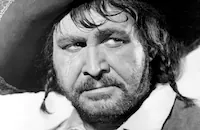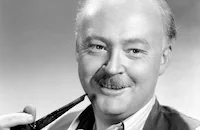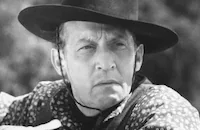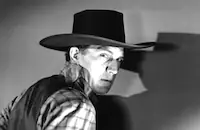Cow Country

Brief Synopsis
Cast & Crew
Lesley Selander
Edmond O'brien
Helen Westcott
Bob Lowry
Barton Maclane
Peggie Castle
Film Details
Technical Specs

Synopsis
In 1875, Texas cattle ranchers in the gulf plains are devastated by the collapse of the world beef market. Desperate to keep their ranches, the cattlemen are forced to sell their beef cattle at a loss for hide and tallow. Ben Anthony, who runs a freight and stagecoach line in Garnet Basin, is delighted to learn that his old friend, Linda Garnet, who is unaware that he loves her, has been called home by her father Walt. Although Walt once looked on Ben as a son, the two became estranged after Ben rejected becoming a cattleman in favor of the freight business. Walt nevertheless instructs Linda's beau, Harry Odell, to include Ben in a meeting he has called to protest the cattle salvage plant that has opened. In town, Ben asks mercantile owner Joe Davis to secretly charge all the Garnet purchases to his account. At the meeting the next day, Walt organizes the local ranchers to pool their manpower, and asks the local businessmen to extend credit to the ranchers so that they can avoid selling their cattle to the salvage company. Walt hopes this will help the ranchers survive until the market for beef improves. To Walt's dismay, however, banker Parker refuses to extend mortgage payments and Ben rejects Walt's request to stop transporting hides from the salvage operation. As the meeting breaks up, Ben learns that Harry and Linda have become engaged, and gives Linda a warm kiss of congratulations. Unknown to Walt, Parker hopes to acquire the failing ranches for their valuable land and is in collusion with Harry and Caddo Sledge, the owner of the rendering plant. When Parker instructs Sledge to rustle cattle from local ranches in order to force the ranchers out of business, Harry agrees to allow Sledge to run the herds across his property. Harry later becomes embroiled in an angry confrontation with Tim Sykes, who with his beautiful daughter Melba, is "nesting" on Walt's ranch. Sykes demands that Harry, who has been secretly romancing Melba, keep his promise to marry her. Harry agrees, and later tells Parker to have Sledge rustle Walt's herd immediately. Parker, meanwhile, attempts to force Joe out of business by calling in his loan on the grounds that he is extending credit to the ranchers. Ben sees through Parker's ruse and goes into partnership with Joe, paying off the loan with money from a bank account elsewhere. During the raid on Walt's herd, an older ranchhand, Skeeter, is murdered. Afterward, Linda checks the brands on the hides of the most recent shipment from the salvage plant and discovers the Garnet brand. Ben is surprised because he has insisted that Sledge present him with a legitimate bill of sale for each shipment, and the receipt for these hides was signed by Tim. In a confrontation with Tim and Melba, Walt angrily orders his ranchhand Smokey to pull down their cabin and demands they leave his land. When Tim grabs a rifle, Smokey shoots and kills him, and Walt rides away. Wracked with grief, Melba tells Linda that her fiancé Harry will avenge her father's death and improve her reputation when he marries her. Linda is shocked by the revelation of Harry's infidelity and is comforted by Ben's steady friendship. Before leaving the scene, Ben confirms with Melba that the signature on the receipt could not be Tim's because he could not write. At the salvage plant, Ben accuses Sledge of forging the bill of sale. Sledge pulls a gun but Ben knocks him out, then advises Sledge to leave town. Melba seeks Harry's help and is shocked when Harry slaps her and breaks their engagement. Melba angrily pulls out a bullwhip and whips Harry to the ground, leaving him helpless. Shortly thereafter, a ranchhand arrives with a note from Linda canceling their engagement and returning the ring. Fritz Warner, a farmer who has long been in love with Melba, proposes marriage and helps her with funeral arrangements for her father. Afterward, Walt apologizes to Melba and admits his responsibility for Tim's death. After Ben rides out of town to secure a new business deal, Sledge and his men attack his freight wagons, scuttling them and killing the drivers, including Smokey, whom Ben had hired. Sledge and his men then attack Tom, Ben's assistant, when he rides out alone to find Ben. Before he dies, Tom cleverly etches the name of his killer in a boulder. Ben returns with news that the U.S. Army wants to purchase a large herd of cattle, and publicly calls a meeting at his ranch. Having determined that Parker and Harry are in collusion, Ben pretends to defend Harry when Parker names him as the mastermind behind all the recent crime. Ben then confronts Harry at his ranch and demands that he divulge his plans for the next cattle raid. That night, Sledge and Harry supervise a stolen cattle drive into a box canyon, where they intend to destroy the cattle with dynamite. Ben leads the ranchers on an attack against the rustlers before they can set off the dynamite, and thereby averts the slaughter. Fritz kills Harry when he refuses to accompany him back to town, and Ben confronts Parker and Sledge in a showdown, ultimately killing them both but getting wounded in the process. Linda swiftly comes to Ben's aid and they finally seal their true love with a kiss.

Director
Lesley Selander
Cast

Edmond O'brien

Helen Westcott
Bob Lowry

Barton Maclane

Peggie Castle

Robert H. Barrat

James Millican

Don Beddoe

Robert Wilke

Raymond Hatton
Charles Courtney
Steve Clark
Rory Mallinson
Marshall Reed
Brett Houston

Tom Tyler
Sam Flint
Jack Ingram
George Lewis
Post Parks
Monty Montague
Lane Chandler
Lee Roberts
Crew
Frank Beetson
Tom W. Blackburn
Adele Buffington
Charles Cooper
Scott R. Dunlap
John C. Fuller
Dan Greenway
Austen Jewell
Edward J. Kay
Ray Mercer
David Milton
Edward Morey Jr.
Harry Neumann
Robert Priestley
Herman Rotsen
Mary Smith
Ilona Vas
Allen K. Wood

Film Details
Technical Specs

Articles
Cow Country
The setting is 1875 south Texas, and cattle ranchers are facing a serious economic depression. A market glut has sent the price of beef plummeting. One rancher (Robert Barrat) is trying to ride out the bad times and hold the community together, but the owner of a local hides-and-tallow business (Robert Wilke) is working in cahoots with a crooked banker (Barton MacLane) who seeks to foreclose on the ranchers. Their cohorts start destroying some cattle (by dynamite!) and rustling others into the hides-and-tallow plant. Edmond O'Brien plays the owner of a stagecoach shipping line who gets caught up in it all.
The cast all received good marks, with supporting actress Peggie Castle making an especially strong impression thanks to a vivid scene in which she horsewhips a man (Robert Lowery) to the ground, after he taunts her for believing that he would marry her. "Peggie Castle is appealingly effective in her best stint to date," declared The Hollywood Reporter, adding: "O'Brien plays with rugged sincerity but looks a little chubby."
Allied Artists had been formed in 1946 as a unit of low-budget studio Monogram, as a reaction to the fact that the market for B pictures was drying up. Allied's films were designed for higher budgets and more prominent star wattage than the usual Monogram fare. In 1953, when Cow Country was released, Monogram transitioned entirely to the Allied Artists name. Allied's head of production at the time was Walter Mirisch, then 31, who would go on to become one of the most successful independent producers in Hollywood history, working with directors like Billy Wilder, Blake Edwards, and Norman Jewison.
By Jeremy Arnold

Cow Country
Quotes
Trivia
Notes
The film opens with a brief voice-over about the 1875 collapse of the "world beef market" and its effect on Texas ranchers.














